- Home
- Helen Forrester
Liverpool Daisy Page 14
Liverpool Daisy Read online
Page 14
“Emily’s bloody useless,” said George with unexpected warmth. “And John’s got to sign on twice a day, you know that.”
“If Ellen hadn’t gone to live in Southampton, she’d have helped,” sighed Nellie, in reference to her brother’s wife.
George ignored this remark, and continued, “Best way to move you, Nell, ’d be to borrow a handcart and lay you on it.”
“Ha, using your brains at last,” sneered his unloving sister. She turned to Nellie. “He’s right, you know. Wrap you up warm. You’d be like Queen Mary in her carriage, you would.” She cackled with laughter.
“Taffy might lend us his,” said George, steadily pursuing a single line of thought.
Nellie raised her tousled head from her pillow. “Ah couldn’t, Daise! What’d people think? Me sitting on a rag and bone man’s handcart, like!”
“They won’t see you,” replied Daisy comfortingly. “We’ll do it after it’s dark, won’t we, George?” She fixed George with a stony stare. “You get the handcart and ask John to help yer. And I’ll get the fire going in our Mam’s room and have it real warm by the time you come after tea.”
George let the newspaper slip off his lap and nodded in a bewildered fashion at Daisy. Even if he had not agreed with her he would not have dared to argue. Arguing with Daisy was like arguing with a tank in Flanders. He wished suddenly that he was a seaman like Mike and could sail away from his troubles ashore for months at a time.
He got up slowly to go to see Taffy about the handcart.
Daisy got up, too. She took a half-crown piece out of her skirt pocket and stuck it on the mantelpiece. When she saw the movement, Nellie immediately protested.
“Daise! We can pay the doctor. George gets his dole today.”
Daisy laughed down at her anxious friend. “Come on. I feel rich today. Me American uncle been and left me a thousand pounds.” She laughed again at her own joke. She felt like a monarch, as she bent to kiss Nellie gently on the forehead.
“Oh, Daise! You sure?”
“‘Course I’m sure. While I work I got money enough.”
Nellie sighed, then smiled at her friend. She laid her head down on her lumpy, stained pillow and closed her eyes. For once, the room was warm. It felt good to rest, to drift for a while. She could be certain that Daisy would look after iddy Joey — and George. She put out her tiny hand towards Daisy. Daisy took it and squeezed it passionately, as if to pass some of her own strength to her.
When the room was empty, Nellie took her rosary from under her pillow, found the cross on it and, with her lips against its comforting presence, she fell asleep.
Daisy’s first attempt at kindling a blaze in her late mother’s bedroom went out, so she got a broomstick and poked around up the chimney. Clumps of soot tumbled down and covered her arms with fine black powder. She cursed, and shoved the broomstick up again. This time part of a bird’s nest descended with a thud, as well as more soot.
She looked at the offending bundle of clay and fine twigs. “Must have built the bloody thing right in the chimney,” she fumed.
She inserted her arm as high as it would go and felt around. She could find no more of the nest, so she swept up the soot and started a fresh fire. This time it burned well.
Clucking with irritation, she washed the soot off herself and changed her ruined blouse. Then she spread over the bed the new blanket intended for her mother and two others she had redeemed from pawn. Between the sheets she slipped two bricks which she had heated in the downstairs oven and wrapped up in newspaper. She emptied the chamber pot and replaced it under the bed.
The room smelled strongly of soot, so she opened the window and leaned out and took a big breath. Though the night was damp, the air from the estuary smelled sweet and fresh. Daisy smiled. With clean, damp air like that Nellie would find her breathing much easier.
When she tidied up her living-room, she found a post card under the door mat. Mike, as usual, was doing fine, it said, so she tossed it on to the mantelpiece to join the other ones already there. She was tired of pictures of Accra.
The card reminded her of Elizabeth Ann’s last letter, which had said that her sentence might be shortened because she had behaved so well. “Bless her iddy-biddy heart!” murmured her mother, as she leaned back in her chair and stared into the fire. A nice-looking girl who might bring a husband home to live with her mother, not like Maureen Mary. Let him be a man who smelled like a man, of sweat and dust or oil or coal, so as you knew he’d been working for you. She felt she could not endure another son-in-law who smelled of talcum powder.
With her stockinged feet on the fender, she began to doze. The young man of the previous night had tired her more than she cared to admit. As soon as Nellie had been put to bed, however, she would instruct George to sit with her, while she herself went out to turn an honest dollar. “You’re a born tart, Daise,” she told herself with a laugh.
Then her eyes sprang open with horror. With Nellie in the house, she could not bring a man home. Yet money in large sums would be needed. She would squeeze a bit of George’s allowance out of him, of course. But it would not be nearly enough. An anxious frown creased her usually smooth forehead, as she tussled with the problem.
The rattle of the handcart over the stone sets of the street, made her leap out of her chair to answer the door.
Nellie was curled up on a pile of newspapers and her old eiderdown. She was covered by John’s overcoat. The bumpy journey through the night chill had shaken her, and she lay exhausted with eyes closed.
“Maybe she’s dead already,” agonised Daisy, as she hurried out.
But Nellie opened her eyes and smiled weakly. “The boys were proper careful of me,” she assured Daisy in response to anxious inquiries.
The two great clumsy men grinned sheepishly. They stood uncertainly, watching the women while Nellie slowly raised herself.
“Na, George. Don’t just stand there. Lift Nellie out and carry her upstairs.” She turned briskly back to Nellie. “Room’s lovely and warm, luv, and waiting for yez.”
Obediently George lifted his wife and carefully carried her in. She was so light that blind terror struck him that she might really die and he would be left with only iddy Joey. He paused on the doorstep, as memories of his ill-treatment of her rushed into his mind. If she died, the devil would take him for his wickedness, he was sure of that.
Nellie felt his chest heave under her and sensed the fear in him. She lifted one tired hand and stroked his face, just as she had had the habit of doing when they were first married. He looked down at her sharply and saw for a second the young, saucy Irish girl he had married, and not a dying woman.
“Nell!” he muttered, “Aye, Nell!”
Her hand closed gently round his neck under the band of his rough cotton shirt. She smiled at him very sweetly.
“Don’t be afraid, Georgie, luv. Daise’ll help us.”
He nodded dumbly.
“Come on, George! She’ll catch her death! Take her in,” ordered Daisy, pushing impatiently from behind.
Like one of the cart horses he had tended in the past, George braced himself for the steep rise of the stairs, and then climbed them slowly and passed through to his late mother’s room.
Daisy was right. It was beautifully warm, though it smelled strongly of soot. The fire glowed a welcome, and two candles flickered extravagantly on the little mantelpiece.
He laid his wife down on the bed, while John and Daisy crowded into the room. John looked around him with surprised interest at the new wallpaper and Maureen Mary’s white curtains drawn over the window. The bed, too, looked lovely with two clean white pillows and a white sheet turned down over good blankets. He thought longingly how he would like to give Meg a room like this, with a fire in it and no children sharing it, so that they could relax in sensuous luxury like in a film.
His wistfulness was rudely broken by Daisy.
“You boys get outta here. I’m going to put Nellie to bed. Then I’m go
ing to make her some bread and milk afore I go to work.” She nodded at John. “You go down and put the kettle on the fire for some tea for her.”
John clomped down the stairs with a “Ta-ra, Nell” as a goodbye to the invalid.
“Ta-ra, well,” responded Nellie. “Thanks, John.” She was still holding her husband’s hand as if afraid to release it. Daisy went to her and slipped her boots off her feet and put them in the hearth.
“I can do for meself, after I’ve rested a bit,” Nellie protested.
“Nay,” said George suddenly. “You let Daisy help you.”
Daisy nodded approvingly. “That’s right. Now you get out of the way and I’ll help her off with her skirt. She’d better keep ’er stockings on for warmth.” She began to untie the tape which held up Nellie’s gathered skirt. “I haven’t got a nightie for you yet, luv. I thought I’d ask the Welfare lady for one — and a coat or something to go over you when you get out of bed. It’d be more comfy.”
Nellie had never owned a nightgown and thought that Daisy was taking too much trouble on her behalf but, when she protested, Daisy pointed out practically that nighties were soon washed through and with the fevers she got she could become sweaty and then she would get cold.
Soon the little woman was laid in bed, the blankets tucked round her, a hot brick at her feet and another at her aching side. “I’ll get some new bags of sand, tomorrow,” promised Daisy. “I threw out the ones I had for Nan ’cos they was leakin’. Sand does keep the heat better, there’s no doubt.”
George was again holding his wife’s hand and Daisy grinned at him knowingly. “Three’s a crowd. I’ll go and make the bread and milk.” And she bustled out with a speed and determination that surprised George, who had always regarded her as a lazy, gossiping bitch.
“Best get back to Joey, George.”
He nodded. He felt bewildered and at a loss in this women’s world of sickness, where the wings of death seemed literally to beat down at him from the shadowy ceiling.
“He’s all right with Mrs. Higgins for now.” The grip on Nellie’s hand tightened. He wanted to get into bed with her and hold her closely as he had done in happier days, without fear that she would shrink from him because she did not want to carry another child.
“George,” whispered Nellie. “Take care of iddy Joey. Bring him to see me tomorrow.”
He roused himself with an effort. “Surely,” he agreed. “He’ll be over on his own in the morning.”
“No.” Nellie’s voice was sharp. “See he goes to school. He can come after school.”
George dropped her hand. “O.K.,” he agreed irritably. An old wound in his back was aching and he moved towards the door sullenly. His wife watched him, her perception heightened by the fear of death.
“Aye, Georgie, come back here a mo’.”
He paused, his hand on the doorknob.
“Come ’ere, now.”
With a face as droopy as that of a basset hound, he came sulkily back to the bedside.
Nellie lifted her arms. “Come ’ere.”
He bent over her, stark fear of her dying breaking through his churlishness. She wrapped her arms around his neck and pulled him to her. She patted his back as if he was a child and kissed his cheek. “And you take care of yourself, Georgie, lad.” She held him to her tightly for a moment. “There’s nothing to be afraid of, do you hear.”
“Aye, Nell,” he whispered brokenly, as he returned her embrace, “I’m so scared. What have we come to, you and me?”
TWENTY-TWO
The January night felt dank, and the wind coming through the dampness seemed more chilling than usual. The few people about hurried along with coat collars turned up or with shawls held tightly across their chests. Even the Ball and Chain, with all its lights gleaming through steamed-up windows, seemed to huddle miserably against the blackened walls of the boarded up warehouse next to it.
And Daisy could not find a client. She hummed her favourite obscene song hopefully in the shadows, every time a male figure hastened by. Then she moved closer to the lights of the pub and flashed her bright white smile. “Like to make a trick, dearie?” she whispered.
Most shook her off impatiently. One who knew her muttered querulously, “In this cold?” and made a rude gesture.
The general dampness turned to light rain, and Daisy cursed the weather roundly under her breath. She told herself despairingly that even a black man would have been welcome on a night like this.
“You won’t do much tonight, duck,” remarked a feminine voice behind her, as she moved into a doorway of the warehouse to shelter. The voice was soft and carried a subdued giggle in it, as if the owner was permanently trying to suppress her laughter.
A figure nearly as plump as herself squeezed into the doorway of the warehouse at the same time as Daisy sought shelter there. She brought with her an overwhelming cloud of violet perfume; and Daisy felt her hackles slowly rise. She eased herself round, to look at what she sensed was an intruding competitor.
Competition it certainly was.
Daisy’s lips tightened as she viewed the cheerfully over-painted face surveying her from under a cheeky-looking veiled hat. A mangy fox fur encircled the woman’s neck and she carried a large, light-coloured handbag in which she was now digging absently while she stared back at Daisy.
“Like a cigarette?” asked the intruder, bringing out a battered packet of Woodbines.
Daisy scowled.
“No.” The single word came out as sharply as a pebble from iddy Joey’s catapult. “And you get off my beat!”
“Aa, stow it!” responded the other woman, as she tore a match out of a folder and lit her cigarette. “I don’t trade in t’streets. I got me own apartment, I have. Got me regulars.” She blew out cigarette smoke which wreathed round Daisy’s head, much to her discomfort. “Once you got some regulars, they tell the other boys and you don’t have to go out that often.”
Daisy blinked her eyes against the tobacco smoke. Then she inquired loftily, “And what may I ask, are you doin’ here if you’ve got everything sewn up so bloody comfortable, like?”
The unwelcome intruder’s voice was gleeful, as she replied. “Been to the pictures. Proper nice film at the Forum.” She sighed blissfully. “Ronald Coleman is a bloody marvel. Have you seen it?” Without waiting for Daisy to reply, she went on, “Got pissed off with the whole bloody issue, so I took meself to the pictures.” She laughed richly. “And I got a man when I come out — proper funny, it was.” Her voice sobered suddenly. “But it isn’t safe in Lime Street if you ain’t got a pimp. You got a pimp?”
“None o’ your business,” snapped Daisy. She stuck out her hand to see if the rain had stopped. It had not.
“Well, I’m telling you, they got Lime Street so tightly laid out they’re on you in a second. Bloody great switchblades, they got. One girl got proper beat up only a couple of weeks ago. I was sweatin’ they’d catch me tonight.”
“I never go there,” replied Daisy, shrugging her damp shawl more tightly round her shoulders.
It was quiet for a moment, while the smoke round Daisy increased rapidly, despite the encroaching rain. The uncrushable sharer of her shelter looked Daisy up and down, “How do yer ever make out in them clothes?” she asked.
“What’s the matter with me clothes? You mind your own bloody business and I’ll mind mine.”
The other woman laughed. “We’re both in the same business, luv. Seen you several times when I been going into the Ball for a quick one.”
Daisy snorted. She was so incensed that she considered plunging out into the icy rain and going home. Then she realised that as far as Nellie and George were concerned, she was at work — and could not go home until a reasonable work period had elapsed.
“Bugger everything!” she growled.
The constable on the beat came slowly down the deserted street. The rain dripped unhappily off his helmet and his waterproof cape. Occasionally, he stopped and flashed his torch whi
le he tried a door lock or checked a window.
When he reached the two sheltering women, he stopped and flashed a torch over both of them. The light rested only cursorily on Daisy, noting the unpainted face, the pursed up mouth and belligerent chin stuck up in the air as if daring him to ask her a question. The torchlight, however, ran thoroughly up and down her companion and came to rest on the heavily rouged face and the merry mascara-rimmed eyes.
“Na, ladies,” he said, not unkindly, “Loiterin’ ain’t allowed. Move along, please.”
“Come on, Officer,” wheedled the painted female. “I’m only sheltering.”
Daisy murmured agreement. This was the first time to her knowledge that the constable on the beat had seen her and she was desperately anxious that he should not remember her in any way. Her well rounded throat quivered, as she tried to keep calm and look like a respectable Irish woman on her way home from St. John’s Market.
The constable inclined his head towards the public house. “What about going to have a drink until it gives over?” he suggested.
The bright-faced female gurgled, “You going to stand us, Officer?”
The constable’s voice hardened at this impudence. “Now you get moving, Missus Woman!” His eyes flashed in the shadow of his helmet. He gestured with his torch. “Out!” he ordered.
Daisy did not wait for any more. Like Moggie on the prowl, she slunk silently past the constable while his light was still on the other prostitute, and started up the street.
The other woman prepared to move also. She arranged her fox fur tighter round her chin.
“Bad cess to you,” she muttered angrily at the irate constable.
“Want me to take you in?” he asked fiercely.
Her answer was lost, as she tottered out on very high heels, which were so worn down that she looked bow-legged as she wobbled up the street after Daisy.
The rain was hissing down now, penetrating Daisy’s thick shawl and running down her back. What a night!
She paused at the corner, wondering what she should do. Nellie certainly made life complicated. Not for one moment did she regret taking in her dear friend — somehow Nellie was going to be fed and nursed back to health. But money had to be found to do it.

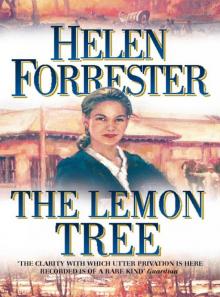 The Lemon Tree
The Lemon Tree Thursday's Child
Thursday's Child Yes, Mama
Yes, Mama Madame Barbara
Madame Barbara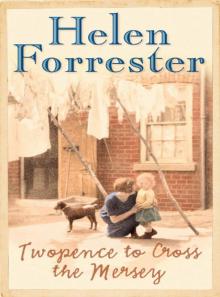 Twopence to Cross the Mersey
Twopence to Cross the Mersey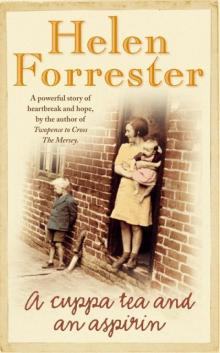 A Cuppa Tea and an Aspirin
A Cuppa Tea and an Aspirin The Moneylenders of Shahpur
The Moneylenders of Shahpur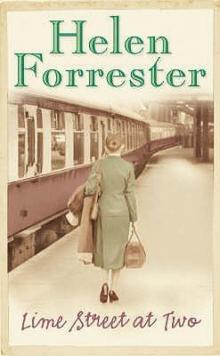 Lime Street at Two
Lime Street at Two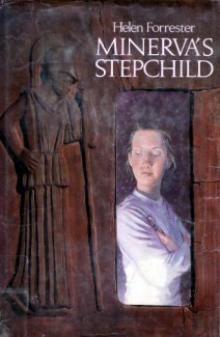 Minerva's Stepchild
Minerva's Stepchild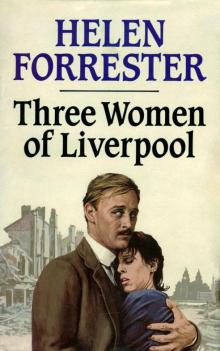 Three Women of Liverpool
Three Women of Liverpool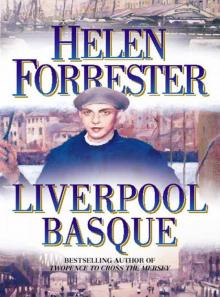 The Liverpool Basque
The Liverpool Basque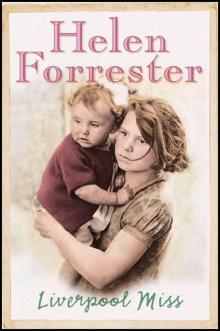 Liverpool Miss
Liverpool Miss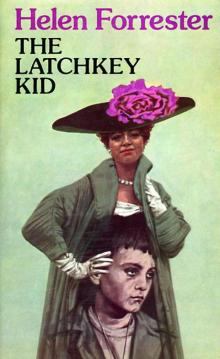 The Latchkey Kid
The Latchkey Kid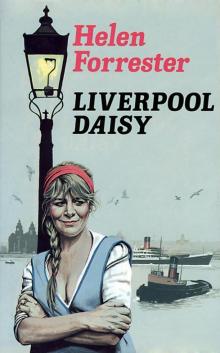 Liverpool Daisy
Liverpool Daisy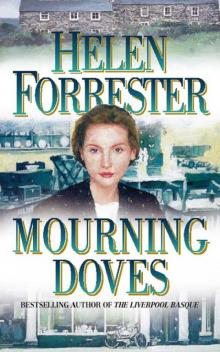 Mourning Doves
Mourning Doves